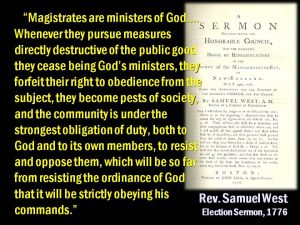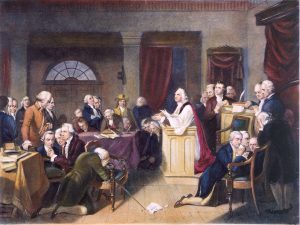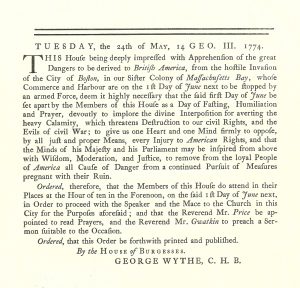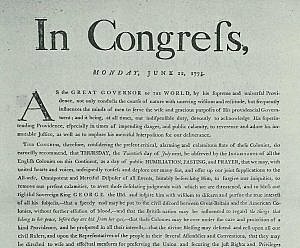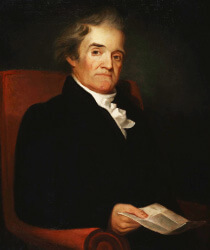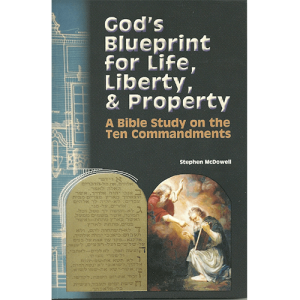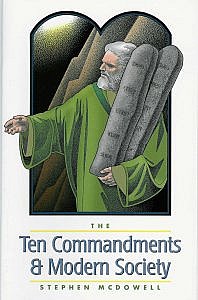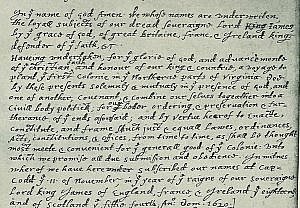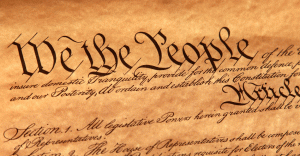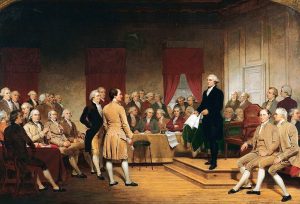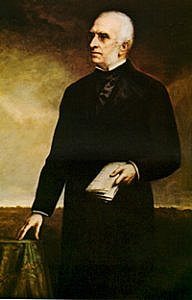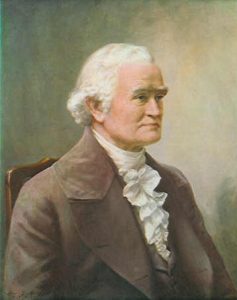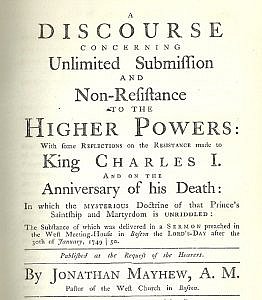Biblical Doctrine of Government in Romans 13
[This article is taken from the book, Ruling Over the Earth, A Biblical View of Civil Government]
Paul’s writing in Romans 13 is perhaps the best-known passage of Scripture regarding civil government. He presents a clear overview of the doctrine of government in the first seven verses, showing that we are to be subject to lawful authority in attitude and action.
1 Every person is to be in subjection to the governing authorities. For there is no authority except from God, and those which exist are established by God. 2 Therefore whoever resists authority has opposed the ordinance of God; and they who have opposed will receive condemnation upon themselves. 3 For rulers are not a cause of fear for good behavior, but for evil. Do you want to have no fear of authority? Do what is good and you will have praise from the same; 4 for it is a minister of God to you for good. But if you do what is evil, be afraid; for it does not bear the sword for nothing; for it is a minister of God, an avenger who brings wrath on the one who practices evil. 5 Therefore it is necessary to be in subjection, not only because of wrath, but also for conscience’ sake. 6 For because of this you also pay taxes, for rulers are servants of God, devoting themselves to this very thing. 7 Render to all what is due them: tax to whom tax is due; custom to whom custom; fear to whom fear; honor to whom honor. (Romans 13:1-7, NASB)
Some of the principles taught in this passage of Scripture include:
1. Civil government is a divine institution ordained by God. All authority is from God.
We examined the origin of civil government in the book of Genesis above. God established government after the fall of mankind to deal with the sinful actions of men. Civil government is a part of God’s kingdom and government, and is itself subject to God. “Every person is to be in subjection to the governing authorities,” which includes those who govern. They are not above the law. Everyone, including governing officials, are subject to the Highest Authority, God.
Civil government’s authority is delegated to it by God, just as is the authority of parents and church leaders. God is the source of all lawful authority. Commenting on Romans 13:1, theologian Charles Hodge wrote,
All authority is of God. No man has any rightful power over other men, which is not derived from God. All human power is delegated and ministerial. This is true of parents, of magistrates, and of church officers. This, however, is not all the passage means. It not only asserts that all government …is…derived from God, but that every magistrate is of God; that is, his authority is jure divino [divine right].[i]
Every official, no matter how he assumes his office and what type of government he operates within, has been delegated authority from God to fulfill the godly mission of government to be “an avenger who brings wrath on the one who practices evil” and to be a minister “to you for good.” All civil leaders are to be ministers of God’s justice, although all do not do so. All have the same duty, yet all do not fulfill that duty. If civil government fulfills its duty, we have an obligation to obey and support it.
Authorities are established (ordained, appointed) by God; that is, they rule only as He allows it. But this does not mean that He arbitrarily appoints all rulers for all nations because the Bible also teaches that those who rule reflect the type of government that the people deserve. God allows the sowing and reaping process to take place in the type of leaders we have. Israel chose their rulers of tens, fifties, hundreds, and thousands (Deut. 1:13; Ex. 18:21-22). They consented to whom would be king (2 Sam. 2:4; 5:1-3; 1 Chron. 11:3). Therefore, when Paul speaks of appointment, this does not usually mean direct selection by God.
All authority and power is from God. By Him kings reign (Prov. 8:15). The usurpation or abuse of power by rulers is not of God, but the power itself is. Even the most corrupt rulers’ power is from God (John 19:11). Magistrates bear the image of God’s authority. Even bad governments perform some good function of providing a degree of order or peace (consider for example, some Middle Eastern nations under current monarchs, or former rulers like Saddam Hussein). Magistrates are God’s servants. They will give account to Him one day on how they governed.
2. God established civil government for the good of man. It is to be a minister (servant) of God for good.
Paul teaches that civil government was instituted by God for the good of mankind. Government is not intrinsically evil. It was not created to be our enemy but for our good. However, to function in this manner, it must perform its biblical purpose. All of God’s creation is good, but God’s good creation can be used for evil when not used according to His specifications in His Word (abuse of plants via drugs or drunkenness is one of innumerable examples). God ordained government for the good of mankind, but man can and has used it for evil. As expressed previously, this is because man is fallen and sinful and his heart is desperately wicked. When placed in positions of power, his tendency is to abuse that power, as witnessed throughout history.
In the context of his teaching on government Paul tells us that we are to overcome evil in the heart of man by the truth of the Gospel (Romans 12). He then writes we are to overcome evil in society by godly civil government (Romans 13:1-4).
Civil government represents God, not the people. It is His servant. It must execute God’s justice, not what it considers to be good for the people. It must look to the only One who is good, God, to be able to administer good (that which is just and right). Rulers are to be servants of God, but they are also to be servants of men rather than lording it over them. (Jesus taught this in Luke 25; see Chapter 5.)
For rulers to best fulfill their biblical mandate as ministers of God for good, we need good people governing. Hence, we must work to get good people in government.
In an election sermon preached in 1776 before the government leaders of Massachusetts, Rev. Samuel West said:
Magistrates are ministers of God…. [W]henever they pursue measures directly destructive of the public good they cease being God’s ministers, they forfeit their right to obedience from the subject, they become pests of society, and the community is under the strongest obligation of duty, both to God and to its own members, to resist and oppose them, which will be so far from resisting the ordinance of God that it will be strictly obeying his commands.[ii]
3. Everyone is to be in subjection to governing authorities. We are to resist those who rebel against God’s higher law.
We are “to be in subjection to the governing authorities” (v. 1, 5). We are not necessarily to obey every mandate of government. When Paul writes that resistance to authority equals resistance to God, he is not presenting an unqualified statement of unlimited submission to all civil authorities because we see in the book of Acts that the apostles resisted governing authorities (Acts 4:18-20; 5:17-29; 16:35-40). The Hebrew midwives, Daniel, and many other Old Testament saints disobeyed the commands of Pharaohs and kings (see for example, Ex. 1:15 – 2:3; Dan. 3, 6). The Bible teaches we must obey God rather than man (Acts 5:29). So we are at times to resist the higher authority and obey the Highest authority (God). We are to render to civil rulers what is due them (v. 7), not more than what is due them. Colonial minister Jonathan Mayhew addressed this well in his sermon, “A Discourse Concerning Unlimited Submission and Non-Resistance to the Higher Powers,” preached in Boston in 1750.[iii]
There is no unlimited submission to civil authorities. After all, Jesus is Lord, not Caesar. Throughout history “Caesars” – that is, civil leaders – have often claimed to be the ultimate authority, denying in word and action the true Lord of all heaven and earth.

Charles Hodge explains Paul’s object in these passages is that,
Magistrates are to be obeyed. The extent of this obedience is to be determined from the nature of the case. They are to be obeyed as magistrates, in the exercise of their lawful authority. When Paul commands wives to obey their husbands, they are required to obey them as husbands, not as masters, nor as kings; children are to obey their parents as parents, not as sovereigns; and so in every case.[iv]
Therefore, to obey the state if it attempts to perform functions of the church or family is to disobey God and render to Caesar the things that are God’s. (For more on this important civil teaching of Jesus Christ see Chapter 5 of Ruling Over the Earth.)
The context of “subjection to governing authorities” in verses 1-5 is rulers who do good and not evil. If rulers do evil, we must act appropriately by obeying God and seeking to change evil government (following the biblical steps of how to resist the tyrant, which will be discussed in Chapter 5). Rulers are to minister good and execute God’s justice against evil. If they do, then we are to obey them, but we are not to support them if they administer evil. How we withhold support from evil rulers is discussed in Ruling Over the Earth.
All power is ordained by God, and civil leaders have a duty to administer God’s justice. We are to obey them as civil rulers fulfilling this purpose. We do not obey them as God, unconditionally.
4. Civil government has been given authority to use force (the sword) to deal with evil doers.
Civil government is God’s instrument “who brings wrath on the one who practices evil.” It has been given authority to use force – “it does not bear the sword for nothing” – to execute God’s vengeance upon evil doers, upon those who break God’s civil laws. As individuals, we are not to execute vengeance upon evil doers, or take revenge (Rom. 12:17, 19). We are to love our enemies (Matt. 5:44) and overcome evil with good (Rom. 12:21). Government is God’s instrument to execute His justice in the earth. Evil action of men is to be overcome by good government.
God gives civil government the authority to use force. It is not given to individuals or the family or church; although, each of these entities have illegitimately used force in various societies throughout history to execute what they considered to be justice. The Bible provides guidelines for the proportion and type of force, as well as for the criminal penalties for various crimes.[v]
Rulers are to restrain and punish evil men, not good men. If they punish good men they are operating outside their domain, and hence, outside this Scriptural command. As such we are under no obligation to obey. When we “do what is good,” we should not be in fear of government. Government should praise us. If government condemns us and inflicts fear upon us when we do what is good, it is operating illegitimately. When vile men rule, government is a terror (Ps. 12:1, 8). Rulers are to be a terror to evil-doers. However, they are often a terror to good-doers. If so, we have a responsibility to take all appropriate actions to change this.
While vile government can provide some protection to people – for example, while some of the leaders of Rome suppressed various God-given rights of people in the empire, they did provide some degree of peace, order, and justice – only godly government will provide the security and blessings that God intends for mankind.
Rulers are to bear the sword of war and the sword of justice. Due to the sinful nature of man, he will not always restrain himself from evil by his own inward convictions or conscience (although Paul says that even sinful man is governed to some degree by his conscience, see Romans 1 and 2). Therefore, the fear of punishment will provide a restraint to sinful people. God’s laws and their penalties help restrain evil-doers (1 Tim. 1:9); therefore, the laws of a nation should be based upon God’s law to be most effective at restraining evil. God’s penalties best deter fallen men from evil actions.[vi]
When rulers punish evil men they act as God’s servants, because God wants peace and order (1 Tim. 2), which are best instituted when rulers uphold His laws and penalties. They are God’s ministers bringing judgment on the action of men. They are not to punish men for wrong intentions and thoughts. Only God judges thoughts and intents.
5. Biblical civil government will not violate Christian conscience.
Romans 13:5 says, “Therefore it is necessary to be in subjection, not only because of wrath, but also for conscience’ sake.” Our conscience tells us what is right to do; that is, it tells us to obey God. Therefore, if government is commanding action contrary to God, our conscience will not tell us to obey evil government, but rather God’s law. Subjection requires our submission to government; that is, we place ourselves under someone else. But when government requires something of us that is contrary to God’s word, we must obey God rather than man (Acts 5:29). Even here, we are submissive, in the sense that we will realize that there will be consequences for disobeying leaders. When do we disobey government? When it forbids what God commands (like prayer, Daniel 6) or commands what God forbids (like idolatry, Daniel 3).
To be in subjection “for conscience’ sake” does not mean that we are to subject our conscience to the will of government leaders or to any man. Only God can make laws binding our conscience. We are to render to God what belongs to God, and our conscience belongs to God, not man. However, pagan man will attempt to govern the conscience. Today, secularists are enacting laws punishing those who oppose homosexuality, attempting to force many businessmen to violate their conscience. They pass hate laws thinking they can discern the motives of the heart.
God wants our subjection to be voluntary and sincere (Eccl. 10:20; 1 Pet. 2:17), but if the ruler’s laws violate God’s law then this cannot be. Secular governments will enact laws that violate some aspect of God’s law. We must resist such tyrannical rulers (see Chapter 5 for how to do this), while at the same time seek to establish godly government. As we take steps to resist and evaluate the probability of success we exhibit “a patient subjection to the penalty without resistance.”[vii] The first century church had little hope of changing unlawful authority and so having this attitude and action showed the rightness of the Christian faith. If we resist unbiblical civil laws, the wrath of civil government will come upon us. We must be prepared to suffer the consequences. But if we subject ourselves to unbiblical laws for fear of punishment, then God will deal with us for disobedience.
We are to be subject to our government and its laws not just out of fear of punishment but for conscience sake. But this requires that the laws that we obey are not in violation of God’s laws, for our conscience will condemn us if we act wrongly. Hence, we need godly rulers and godly laws to be able to truly fulfill this requirement.
6. Citizens have a duty to render to civil government that which is due it.
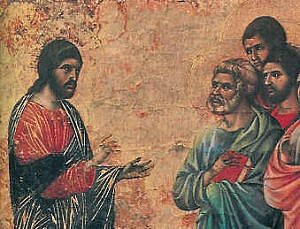
We are to give to government what it is due. Jesus said we are to render to Caesar (the state) what is due him (Matt. 22:15-21; see Chapter 5). This includes paying taxes, which supports the government as it fulfills its biblical purpose. This purpose will be covered more thoroughly later, but in general, government is to punish evil-doers and protect law-abiding citizens’ life, liberty, and property. In other words, it is to do “good” – to administer God’s justice in its sphere of responsibility. If civil leaders do “bad,” then we are under obligation to take the appropriate steps to change corrupt government. We will discuss later what is due to government. While we are to submit to government, this is not an unlimited submission.
Order the book Ruling Over the Earth, A Biblical View of Civil Government
[i] Charles Hodge, Commentary on the Epistle to the Romans, Revised edition. New York: Armstrong, 1893, p. 639. In Rousas John Rushdoony, Politics of Guilt and Pity, Vallecito, Cal.: Ross House Books, 1995, p. 336.]
[ii] Samuel West, A Sermon Preached before the Honorable Council, and the Honorable House of Representatives of the Colony of Massachusetts-Bay in New-England, May 29th, 1776, Boston: Printed by John Gill, 1776, in John Wingate Thornton, The Pulpit of the American Revolution, Boston: Gould and Lincoln, 1860, pp. 283-284.
[iii] Jonathan Mayhew “A Discourse Concerning Unlimited Submission and Non-Resistance to the Higher Powers,” Boston: Printed by D. Fowle and D. Gookin, 1750, In Thornton, pp. 39-104.
[iv] Hodge, p. 641, in Rushdoony, p. 337.
[v] For more on this see Stephen McDowell, Crime and Punishment: A Biblical Perspective, Charlottesville: Providence Foundation, 2011.
[vi] See McDowell, Crime and Punishment.
[vii] Matthew Henry’s Commentary on the Whole Bible, Hendrickson Publishers, 2002, Rom.13:1-7, pp. 2229-2231.



